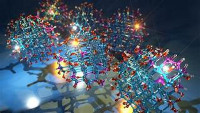Preparation and Characterization of Usnic Acid Nanocrystals with the Wet Grinding Method Using a Planetary Ball Mill http://www.doi.org/10.26538/tjnpr/v8i1.13
Main Article Content
Abstract
Usnic acid is a potential active pharmaceutical ingredient derived from Usnea sp. It has a low bioavailability because of poor aqueous solubility. Particle size reduction by nanosizing has been applied to improve the solubility of active pharmaceutical ingredients which is achieved by preparation of nanocrystals. This study aimed to prepare usnic acid nanocrystals by employing a wet grinding method with a planetary ball mill and using Poloxamer 188 as a stabilizer. The solid state properties of the resulting usnic acid nanocrystals were characterized with a particle size analyzer, Fourier transform infrared spectroscopy (FTIR), X-ray diffraction (XRD), differential scanning calorimetry (DSC), and dissolution rate profile. Usnic acid nanocrystals had a particle size of 358.77 ± 21.18 nm, evenly distributed with a polydispersity index of 0.591±0.02 and a zeta potential of −24.4 ± 0.1. The DSC thermogram showed a sharp endothermic peak at 193.413°C. The XRD pattern contained a high-intensity crystalline peak at 2Ɵ=10.213°. The dissolution rate of the usnic acid nanocrystals was 2.7 fold faster than that of the intact usnic acid. This study concluded that nanocrystals of usnic acid have improved physicochemical properties and a significantly increased dissolution rate.
Downloads
Article Details
Section

This work is licensed under a Creative Commons Attribution-NonCommercial-NoDerivatives 4.0 International License.
How to Cite
References
Ingolfsdottir K. Usnic acid. Phytochemistry. 2002;61(7):729–36.
Jin J, Rao Y, Bian X, Yang G. Solubility of (+)-usnic acid in water, ethanol, acetone, ethyl acetate and. J Solut Chem. 2013;42(5):1018–27.
Fitriani L, Rismawati E, Umar S, Zaini E. Solid dispersion of usnic acid-PVP K30 and evaluation of antioxidant activity. RJC. 2018;11(4):1643–8.
Fitriani L, Afriyanti I, Afriyani A, Ismed F, Zaini E. Solid dispersion of usnic acid–HPMC 2910 prepared by spray 4.drying and freeze drying techniques. Orient J Chem. 2018;34(4):2083–8.
Zaini E, Nisak RK, Utami RDWI, Fitriani L, Ismed F. Effect of milling on physicochemical properties of usnic acid isolated from Usnea sp. Orient J Chem. 2017;33(6):3031–6.
Kayaert P, Mooter G Van Den. Is the amorphous fraction of a dried nanosuspension caused by milling or by drying? A case study with Naproxen and Cinnarizine. Eur J Pharm Biopharm. 2012;81:650–6.
Shinde A, Jadhav N, More H, Heena N. Design and characterisation of lopinavir nanocrystals for solubility and dissolution enhancement. Pharm Sci Asia. 2019;46(3):193–205.
Can HK, Kavlak S, ParviziKhosroshahi S, Guner A. Preparation, characterization and dynamical mechanical properties of dextran-coated iron oxide nanoparticles (DIONPs). Artificial cells, nanomedicine, and biothechnology. 2017;46(2):421-431.
Sathali AH, M G, Formulation and Evaluation of Paliperidone Nanocrystals. BioMedRX. 2013;1(5):422-438.
Peltonen L, Hirvonen J. Pharmaceutical nanocrystals by nanomilling : critical process parameters, particle fracturing and stabilization methods. JPP. 2010;62:1569–79.
Ozturk AA, Yenilmez E, Arslan R, Senel B, Yazan Y. Dexketoprofen trometamol-loaded Kollidon® SR and Eudragit® RS 100 D polymeric nanoparticles: Formulation and in vitro-in vivo evaluation. Lat Am J Pharm. 2017;36(11):2153–65.
Jain AK, Thareja S. Pharmaceutical nanocarriers used for drug delivery. Artif Cells, Nanomedicine, Biotechnol. 2019;47(1):524–39.
Monshi A, Foroughi MR, Monshi MR. Modified Scherrer equation to estimate more accurately nano-crystallite size Using XRD. WJNSE. 2012;2012(2):154–60.
Sumadiyasa M, Manuaba IBS. Penentuan Ukuran Kristal Menggunakan Formula Scherrer, Williamson-Hull Plot, dan Ukuran Partikel dengan SEM. Bul Fis. 2018;1(1):28–34.
Selvia N, Dahlan K. Sintesis dan karakterisasi tricalcium phosphate berbasis cangkang kerang ranga pada variasi suhu sintering. J Biofisika. 2012;8(1):42–53.
Zaini E, Azhari D, Fitriani L. Identification and characterization of solid binary system of quercetin-nicotinamide. Orient J Chem. 2016;32(3):1–6.
Leyva-Porras C, Cruz-Alcantar P, Espinosa-Solís V, Martínez-Guerra E. Application of differential scanning calorimetry (DSC) and modulated differential scanning calorimetry (MDSC) in food and drug Industries. Polymers (Basel). 2020;12(5):1–21.
Lai SL, Guo JY, Petrova V, Ramanath G, Allen LH. Size-dependent melting properties of small tin particles: Nanocalorimetric measurements. Phys Rev Lett. 1996;77(1):99–102.
Quan P, Xia D, Piao H, Piao H, Shi K, Jia Y, Cui F,. Nitrendipine nanocrystals: Its preparation, characterization, and in vitro – in vivo evaluation. AAPS PharmSciTech. 2011;12(4):1136–43.
Shinde AJ, Sankpal MS, Salokhe S V, More HN, Chitranagari N. Design and characterization of niternedipine nanocrystals for solubility and dissolution enhancement. Int J Pharm Sci Rev Res. 2020;62(11):66–72.
Dwichandra O, Putra D, Yonemochi E, Uekusa H. Isostructural multicomponent gliclazide crystals with improved solubility. Cryst Growth Des. 2016;1–23.
Du B, Shen G, Wang D, Pang L, Chen Z, Liu Z. Development and characterization of glimepiride nanocrystal formulation and evaluation of its pharmacokinetic in rats. Drug Deliv. 2013;20(1):25–33.
Lotfy NS, Borg TM, Mohamed EA. The promising role of chitosan–Poloxamer 188 nanocrystals in improving diosmin dissolution and therapeutic efficacy against ferrous sulfate-induced hepatic injury in rats. Pharmaceutics. 2021;13(2087):2–28.




